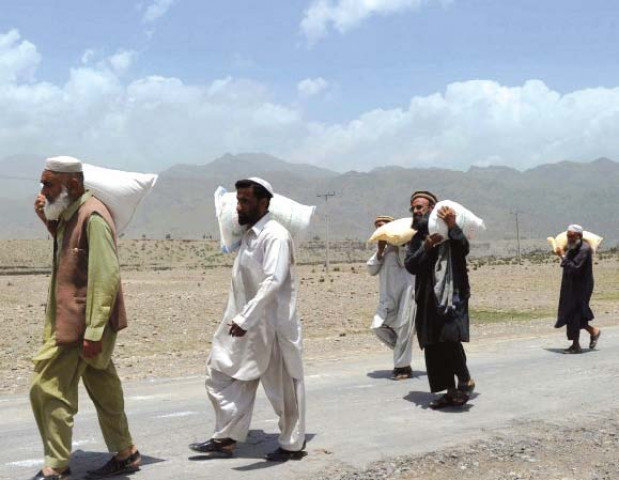IDP repatriation: Refugees reluctant to go home
Many still fear the security situation, lack of schools for their children.

As the government begins a voluntary repatriation programme for people displaced by the war against the Taliban, most of the refugees from Bajaur and Mohmand tribal districts seem unwilling to go back home.
The Khyber-Pakhtunkhwa government and the Fata Disaster Management Authority (FDMA) will begin repatriating internally displaced persons living in refugee camps in Jalozai and Risalpur, a voluntary process that begins on April 11.
Many of the refugees seem overwhelmed by the prospect of going back homes that have been destroyed and fields that have remained untilled for several months.
“Our fields are lying untilled, our homes have been destroyed and the army is still there, so how can we go back to Bajaur?” said Khan Zareen, a resident of the Charmang area of Bajaur.
He suggested that the government should offer some monetary incentives to get people to move back home. “We will be starting our lives from scratch so the authorities should at least pay us some money.”
The Jalozai Camp is situated in the Nowshera, in a barren area that lacks any kind of shade and has only rows upon rows of tents. The camp has housed most of the IDPs who were rendered homeless by the ongoing conflict against the Taliban militancy in Khyber-Pakhtunkhwa and Fata. Around 96,000 people from Khyber, Bajaur and Mohmand still live in the camp, according to official figures. “If the authorities forced us out of this camp, then we will go to Punjab or rent houses in the nearby areas, but will not return to Bajaur,” said Nimatullah, a resident of the Laghary area of the Khar tehsil.
He said that if a lasting peace is restored, then people will not wait for government announcements and will go back to their homes on their own.
Mohammad Rafiq, another tribesman, said that their return will cause them to confront many problems, the most serious of which being lack of education for their children. Many of the schools in the tribal districts lie destroyed.
“If the government is interested in our repatriation, then it must keep the situation in the tribal districts in mind, instead of issuing dates for our return,” he said.
In an effort to persuade people to leave, say some refugees, the government has ended its ration distributions to the IDPs since the beginning of March.
However, the Jalozai Camp administrator Noor Akbar Afridi said that the repatriation was strictly a voluntary process and that the suspension of food rations was done by international donor agencies, not the government. “IDPs will not forcibly be made to leave the camp,” he said.
Afridi said that the FDMA has taken charge of the return of the IDPs from the Provincial Disaster Management Authority (PDMA). He claimed that the government has cleared the militant presence in almost all parts of Bajaur except Chamarkand and Kamangara, and most of Mohmand, except Safi and Beazai.
Akbar claimed that the FDMA will provide all kinds of facilities for the refugees’ return and will also help in the reconstruction of their destroyed homes.
Published in The Express Tribune, April 6th, 2011.



















COMMENTS
Comments are moderated and generally will be posted if they are on-topic and not abusive.
For more information, please see our Comments FAQ